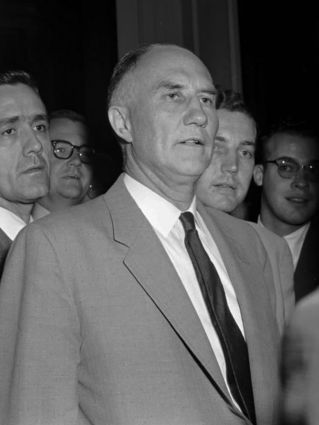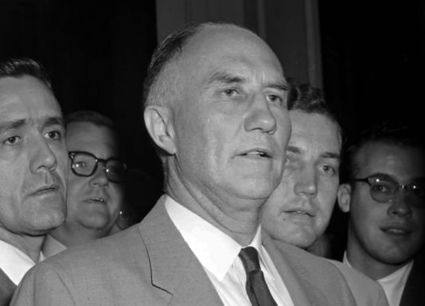Fifty years after landmark bill signed, voting rights still fiercely debated
Last updated 8/11/2015 at Noon
Republican Sen. Strom Thurmond of South Carolina leaves the senate floor after staging a record 24 hour, 18 minute nonstop filibuster against a civil rights bill in 1957.
Fifty years ago, Southern lawmakers tried in vain to stop the Voting Rights Act, calling it an unconstitutional assault on their states’ right to decide who was qualified to cast a ballot.
“The bill is tailor-made to Martin Luther King’s demand for Negro control of the political institutions of the South,” Democratic Sen. Allen Ellender of Louisiana, said on the Senate floor in 1965. “Only through such a nefarious piece of legislation could incompetents gain control of the political processes in the South or in the United States.”
Republican Sen. Strom Thurmond of South Carolina argued that passing the Voting Rights Act would make Congress “the final resting place of the Constitution and the rule of law.”
“For it is here that they will have been buried with shovels of emotion under piles of expediency,” Thurmond said.
As the 50th anniversary of the Voting Rights Act approaches on Aug. 6, the law is considered a landmark achievement in the struggle for civil rights and an inclusive democracy. Bipartisan majorities in Congress repeatedly have renewed it, and it’s credited with transforming the South by giving African-Americans the ability to share in civic life.
But shades of the 1965 states’ rights debate have returned to Washington. A 2013 Supreme Court decision tossing out one part of the law has reopened the 50-year-old question over whether federal officials should be able to veto local election laws before they take effect because they might harm minority voters.
The justices invalidated the formula that had been used to determine which states, towns and cities had to get federal permission — or preclearance — before making any changes to their voting procedures. The provision is credited with preventing hundreds of discriminatory voting laws from taking effect, especially in the South.
Today’s Southern Republicans are invoking a similar states’ rights argument on why the court’s decision ending preclearance should be left alone. They say preclearance is an unnecessary relic and Congress should get out of the business of presuming some states will use new district boundaries, voter ID laws or relocated polling places to suppress the minority vote.
“The fact of the matter is we have a Voting Rights Act — it is very strong,” Rep. Bob Goodlatte, R-Va., chairman of the House Judiciary Committee, told the Roanoke (Va.) Times in June. “We are certainly willing to look at any new evidence of discrimination if there is a need to take any measures. But at this point in time, we have not seen that, and therefore no changes have been made since the Supreme Court decision.”
Some in Congress, especially African-American and Latino Democrats, see the 2013 court decision as an invitation to update the preclearance formula and reinstate the practice in places with a recent history of problems.
A narrow, bipartisan proposal to update the formula last year never came to a vote. This year, a broader version affecting more states has been introduced but without GOP support.
Democratic Rep. Terri Sewell of Alabama, who is black, said the roadblocks facing minority voters today are more subtle than the literacy tests used before the Voting Rights Act was signed by President Lyndon Johnson. But it took her disabled father five-and-a-half hours last year to get a voter ID card required under a new state law, and a federal judge ordered the city of Evergreen, Ala., last year to redo a discriminatory redistricting plan.
“We don’t have to count the marbles in a jar or recite all 67 counties in Alabama to get our voting card, but there is no denying there are barriers being placed,” Sewell said.
Preclearance also was a big part of the emotional voting rights debate of 1965. Southern opponents wanted to continue using literacy tests to determine which voters were “qualified,” and they insisted that the attorney general and federal judges in Washington shouldn’t be able to prevent the practice.
“The federal government cannot go into voter qualifications in the states,” said Sen.James Eastland, D-Miss. “This bill would do violence to that provision in the Constitution.”
Sen. Lister Hill, D-Ala., made a last-minute pitch against the Voting Rights Act in late May that year.
“There is yet time to halt this head-on rush to the destruction of the basic rights of the individual states and the liberties of the American people to satisfy the demands, the clamor, and the expediency of the day,” Hill said. “Never in my more than 40 years in Congress have I seen a measure come before this body that has had such built-in potential for the destruction of our constitutional system and the breakdown of law and order as the pending bill.”
Rep. John Conyers, D-Mich., is the only current member of Congress who was serving when the Voting Rights Act was passed in 1965. In an interview Thursday, Conyers said the debate back then was driven by race.
“They were not willing to end the segregation,” Conyers said of the Southern lawmakers. “Here, there is a little bit more subtlety in their opposition. They’re claiming it’s not necessary and things are better and that we’ve done all that we’ve need to do, which is clearly not the case.”
Rep. James Clyburn, D-S.C., was teaching in South Carolina in 1965 but vividly remembers the fierce opposition the Voting Rights Act faced from Thurmond and other Southern lawmakers.
“The arguments are basically the same today,” he said. “This whole notion that once you pass 1965 you can forever look at it in the rearview mirror is not true.”
















Reader Comments(0)